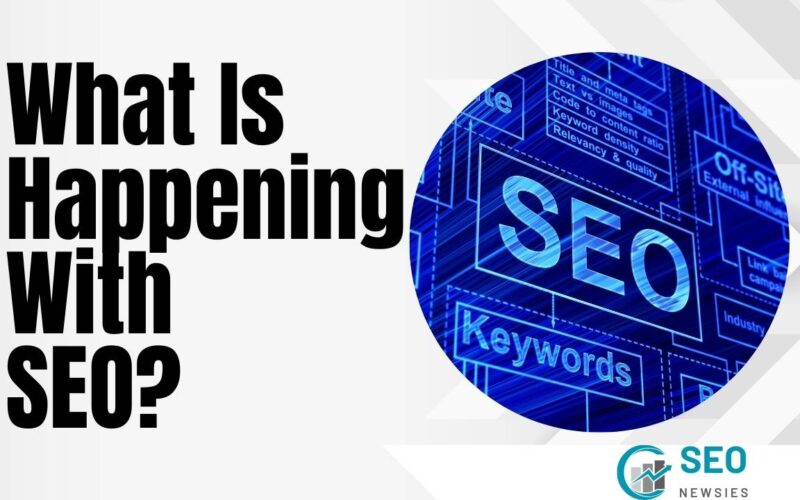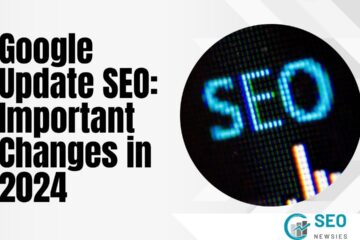Search Engine Optimization (SEO) has been the backbone of digital marketing for years, but what is happening with SEO? The landscape is shifting rapidly, and it’s no longer about just keywords or backlinks. SEO is evolving into a multifaceted strategy that involves user experience, artificial intelligence, and adapting to constant algorithm updates.
The Evolution of SEO
SEO started as a simple strategy, where stuffing a page with keywords could land you a top spot on search engines. However, as search engines have become more sophisticated, so has SEO. Over the years, search engines like Google have changed how they rank content, and now, factors like user engagement, mobile-friendliness, and content quality are just as important as traditional SEO tactics.
Why SEO is More Important Than Ever
As businesses and content creators fight for visibility in an increasingly crowded digital space, SEO is more critical than ever. Whether you’re running a blog, an e-commerce site, or a service-based website, optimizing your content for search engines ensures that you’re getting in front of the right audience. It’s the difference between being buried on page 10 of Google and landing on that golden first page.
Key SEO Trends
SEO trends are driven by changes in technology, user behavior, and how search engines process information. Let’s dive into the key trends shaping SEO this year.

Shift to User Experience (UX)
Google is focusing heavily on user experience, with metrics like page load time, mobile-friendliness, and overall site usability playing a significant role in rankings. This means that websites that prioritize UX, making them faster and easier to navigate, will outrank those that don’t.
The Rise of AI in SEO
Artificial intelligence (AI) is transforming SEO. From generating insights into user behavior to optimizing content creation, AI tools are helping marketers refine their SEO strategies with precision.
How AI Tools are Shaping Search Results
AI is not just assisting in keyword research; it’s actively determining the search results we see. Google’s AI-powered algorithms, like RankBrain, analyze user intent and deliver results that match not only what people are searching for but also how they are searching.
Core Web Vitals and Their Impact
Core Web Vitals are a set of metrics that Google uses to measure user experience on your site. These include things like loading performance, interactivity, and visual stability. Sites that score well on these metrics will be rewarded with higher rankings.
Voice Search Optimization
With the rise of smart speakers and voice-activated assistants like Siri and Alexa, optimizing for voice search is no longer optional. Voice search queries tend to be longer and more conversational, so creating content that answers questions clearly and concisely is key.
Video SEO and the Growth of Visual Search
Video content is booming, and optimizing your videos for search engines is more important than ever. Video SEO includes using relevant titles, descriptions, and tags, along with adding transcripts to help search engines understand the content of your videos. Additionally, visual search tools, such as Google Lens, are making it possible for users to search using images, which is changing how people discover content.
The Impact of Algorithm Updates
Google frequently updates its algorithms, and keeping up with these changes is crucial for maintaining your SEO performance.
Google’s Core Algorithm Changes
Each year, Google rolls out several core updates that can shake up the SEO landscape. Google’s focus remains on delivering the most relevant and trustworthy content to users. Websites that fail to meet these standards are likely to see a dip in rankings.
E-A-T and YMYL: What You Need to Know
Google emphasizes expertise, authoritativeness, and trustworthiness (E-A-T), especially for “Your Money or Your Life” (YMYL) content that can impact someone’s health, safety, or finances. If your content falls under these categories, ensuring you have credible sources and authorship is crucial.
How Mobile-First Indexing Affects SEO
Google has fully transitioned to mobile-first indexing, meaning it predominantly uses the mobile version of the content for indexing and ranking. If your website isn’t mobile-optimized, you’re likely losing out on search rankings.
On-Page SEO
On-page SEO refers to the optimization techniques you apply directly to your website to improve its ranking.

Importance of Keyword Intent
It’s not just about targeting keywords anymore; it’s about understanding the intent behind those keywords. Are users looking to make a purchase, gather information, or compare options? Aligning your content with the user’s intent can significantly boost your SEO performance.
Optimizing for Featured Snippets
Featured snippets, those boxes of information at the top of Google’s search results, are highly coveted. To optimize for snippets, structure your content in a way that answers common questions concisely.
Structured Data and Schema Markup
Structured data and schema markup help search engines understand the content on your website better. By adding this to your site, you can increase the chances of appearing in rich results, such as product listings, reviews, and more.
Off-Page SEO Strategies
While on-page SEO is crucial, off-page strategies like link building are still essential.

Backlinks Quality Over Quantity
Gone are the days of building as many backlinks as possible. The quality of your backlinks matters more than ever. Links from reputable, authoritative sites will have a much greater impact on your ranking than a high volume of low-quality links.
Building Authority and Trust
Establishing your website as an authority in your niche is key to long-term SEO success. This can be done through consistent, high-quality content, earning mentions from credible sources, and engaging with your audience across different platforms.
Local SEO: A Rising Force
Local SEO continues to grow in importance, especially for small businesses looking to attract nearby customers.

Google My Business Optimization
Having a well-optimized Google My Business (GMB) profile is essential for local search visibility. Make sure your information is accurate, up-to-date, and that you’re actively collecting reviews.
Importance of Reviews and Citations
Customer reviews and local citations are essential factors for local SEO. Positive reviews can boost your visibility and attract more customers, while citations (mentions of your business’s name, address, and phone number on other websites) help verify your business’s legitimacy.
SEO Challenges
While SEO is more powerful than ever, it also comes with its own set of challenges.
Adapting to Changing Algorithms
The frequent updates to search engine algorithms mean that what works today may not work tomorrow. Staying ahead of these changes and adapting your strategies is crucial to maintaining your rankings.
The Role of Privacy Regulations
With the increasing focus on user privacy, regulations like GDPR and CCPA are changing how websites collect and handle user data. This affects SEO because it limits the amount of data available to track user behavior and refine strategies.
Conclusion: The Future of SEO
SEO is more complex, dynamic, and user-focused than ever before. It’s no longer just about keywords or backlinks—it’s about creating high-quality, user-centric content that meets search engines’ evolving standards. As technology continues to advance, SEO strategies will need to adapt to keep pace with these changes.
See Also: How To Leverage Heatmap Local SEO 5×5 For Better Local Results





